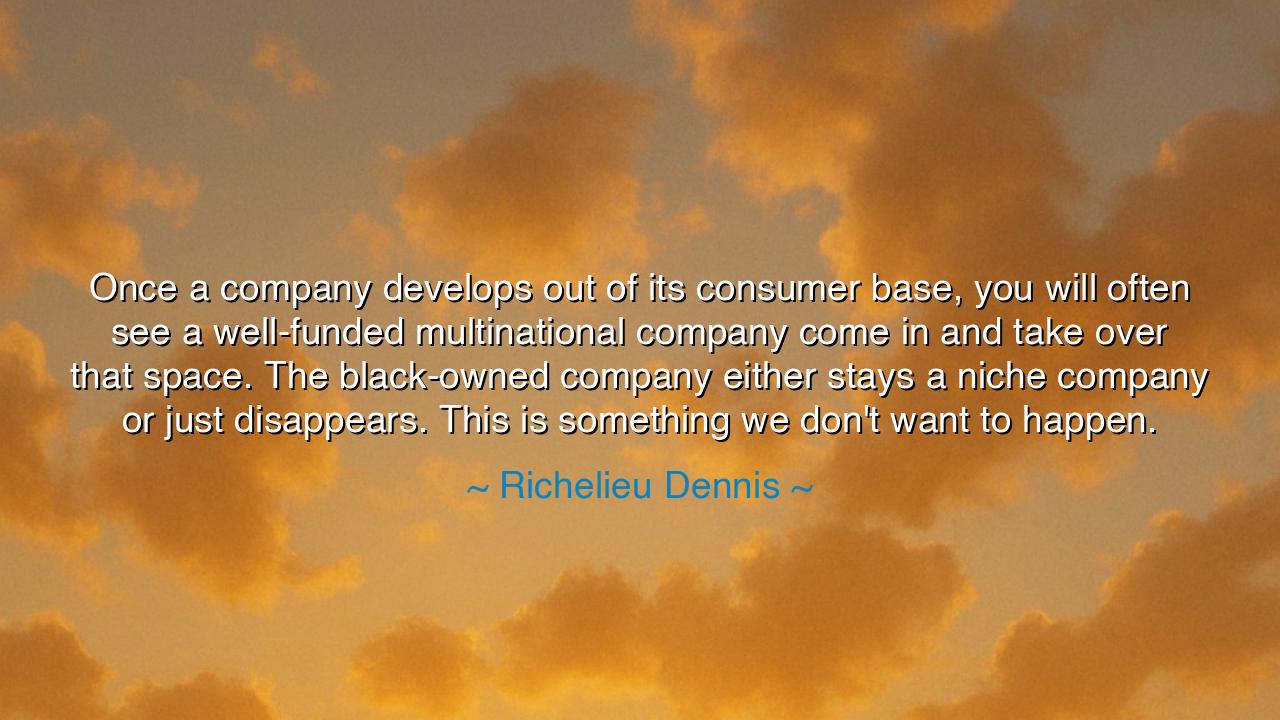
Once a company develops out of its consumer base, you will often
Once a company develops out of its consumer base, you will often see a well-funded multinational company come in and take over that space. The black-owned company either stays a niche company or just disappears. This is something we don't want to happen.






Hear the solemn warning of Richelieu Dennis, entrepreneur and builder of legacies, who declared: “Once a company develops out of its consumer base, you will often see a well-funded multinational company come in and take over that space. The black-owned company either stays a niche company or just disappears. This is something we don’t want to happen.” Though spoken of markets and commerce, these words carry the resonance of history, struggle, and survival. For they are not about profit alone—they are about identity, sovereignty, and the power to endure against giants.
The origin of this truth lies in the lived experience of Dennis himself, founder of SheaMoisture, whose work was rooted in serving the needs of Black women ignored by larger corporations. He saw with his own eyes the cycle of innovation and erasure: small, black-owned companies, born of necessity and creativity, would rise to meet the needs of their people. But once their vision proved fruitful, the mighty multinationals, armed with boundless capital and machinery, would swoop in, claim the space, and leave the originators struggling to survive. What was created by the community was then consumed by outside power.
History is filled with echoes of this pattern. Consider the Greenwood district of Tulsa, often called “Black Wall Street.” Here, African Americans built thriving businesses—banks, shops, theaters, and trade houses—that nourished their community and gave them dignity. But when outside forces of envy and racial violence descended in 1921, this flourishing economy was destroyed. In another sense, it was the same tragedy Dennis speaks of: the birth of greatness in a community, only to see it crushed by the overwhelming hand of others, whether by violence or corporate takeover.
The meaning of Dennis’s words is not confined to economics—it is a call to vigilance and empowerment. He teaches that for a people to secure their dignity, they must guard their enterprises, strengthen their institutions, and ensure that when success comes, it does not slip from their hands into the coffers of those who neither bore the burden nor carried the vision. To lose ownership is not only to lose profit, but to lose voice, presence, and the ability to shape one’s destiny.
And yet, his words are not only warning, but exhortation. For Dennis reminds us that this fate is not inevitable. It is “something we don’t want to happen.” Therein lies the power of foresight. If communities recognize the danger, they can build strategies of resistance: investment in their own, support for their enterprises, and structures that ensure long-term survival rather than temporary rise. Endurance, not mere creation, is the goal.
The lesson for us is this: protect what is yours. Whether it is a business, a culture, or a dream, do not let it be taken once it begins to flourish. Understand that growth invites challenge, and that the powerful will always seek to consume what they did not create. Therefore, build not only with vision, but with fortification—structures of community, solidarity, and reinvestment. In this way, the fruit of your labor remains with you, and your story is not erased.
Practical actions flow from this wisdom. Support black-owned companies not only when they are small, but when they grow, so they need not depend on outside powers. Teach the next generation the value of ownership, so they see their heritage not as fragile but as enduring. Create alliances and institutions that protect community-built enterprises from being swallowed by larger multinationals. And above all, remember that buying, building, and sustaining within your own community is not a mere economic act, but a spiritual one—an affirmation of dignity and destiny.
Thus, Richelieu Dennis’s words must be heeded as ancient counsel dressed in modern form: guard your creations, lest they be consumed by those who neither bled nor dreamed for them. For to endure is not only to build, but to preserve. And when the day comes that the children of tomorrow ask what legacy was left for them, may they find not stories of disappearance, but monuments of resilience—companies, cultures, and communities that remained in their own hands, unbroken, unbowed, and everlasting.






AAdministratorAdministrator
Welcome, honored guests. Please leave a comment, we will respond soon